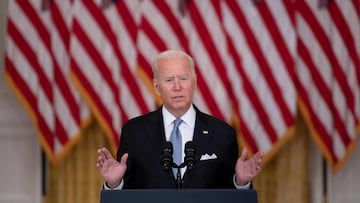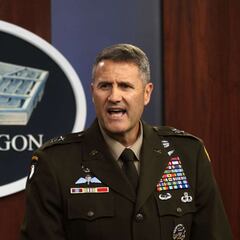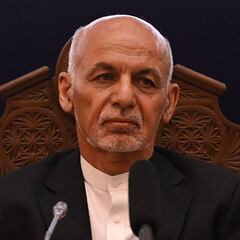What did President Biden say about the US leaving Afghanistan and the Taliban taking Kabul?
After images of the US withdrawal from tricked out over social media, President Biden spoke from the East Room to discuss his decision to leave and the chaos on the ground.


Images from the US withdrawal from Afghanistan trigger an emotional response in the United States -- and around the world -- as they tell a similar story to the United States' exit from Vietnam in the 1970s.
While the troop drawdown has been happening quietly for months, the situation took a turn for the worse when the Taliban took control of the Afghan capital, Kabul, in a matter of hours on Sunday.
The Taliban takeover drove thousands of desperate Afghans to the city's airport in an attempt to make it on one of the last flights out of the country.
Shortly after the videos from the Kabul airport began to surface, media outlets, lawmakers, and activists began to criticize Biden for the withdrawal. In repose, Biden took to the airwaves from the East Room on Monday afternoon to discuss his decision and the next steps for those who still need to be evacuated.
Our current military mission in Afghanistan will be short in time and focused in its objectives: Get our people and our allies to safety as quickly as possible. pic.twitter.com/eSESK5QR09
— President Biden (@POTUS) August 17, 2021
US officials watched in shock as the Taliban took Kabul
While not a surprise to many in the US military and intelligence community that the Taliban have taken Kabul, many are shocked by the speed at which it fell.
During his candid speech on Monday, Biden said, “I always promised the American people that I will be straight with you. The truth is: This did unfold more quickly than we had anticipated.”
Since taking office a little over seven months ago, the Biden administration has worked to comply with an agreement decided between the Taliban and President Trump. Under the agreement, the US had promised to draw down all US troop presence by May 2021.
However, with the Taliban taking Kabul in a matter of hours on Sunday 14 August, images from the Kabul airport have sent a chill down the spine of people around the world. Images of people holding on to airplanes as they take off and subsequently falling to their death incapsulate the lengths many in the country are willing to take to escape Taliban rule.
While unable to meet the May deadline, all US military personal were expected to be sent home by the end of this month. However, with recent events causing unrest and chaos, more troops have been sent to keep those in need of evacuation safe from the Taliban. In addition to US military and government personal, the US has committed to evacuating Afghani nationals who supported the United States, including translators and other experts. These individuals and their families are seen as enemies by the Taliban, and their lives are at risk should they not be able to leave as the Taliban takes control of the entire country.
What did President Biden say in his speech?
In describing why Kabul was able to fall to the extremist group so quickly, Biden said that the “Afghanistan political leaders gave up and fled the country. The Afghan military collapsed, sometimes without trying to fight.” For the President, these two factors are evidence the US’ decision to leave the country was the right one.
The President also spoke to the original mission of the war, to “get those who attacked us on September 11th, 2001, and make sure al Qaeda could not use Afghanistan as a base from which to attack us again.”
After the tragic events of 9/11, many officials and leaders, including then-Senator Joseph Biden, argued that the invasion was necessary to prevent another attack on the homeland. And while the US did successfully capture and kill Osama bin Landen, the mastermind behind the attack, with the Taliban back in control, the country could quickly become a haven for extremists.
In 2001, one member of Congress, Baraba Lee of California, was able to predict the further stabilization and bloodshed the invasion could cause. Con. Lee was the only member of the House to vote against the invasion, and in a recent interview, she said that "I knew then, like I know now, that there's no military solution in Afghanistan."
The next time we cast a vote with such permanent consequences, I pray I am not alone.
— Barbara Lee (@BLeeForCongress) August 16, 2021
But if I am, then so be it. I will always fight for the people. https://t.co/8vAXl9ePus
During the speech, Biden also articulated his views on what was not the responsibility of the US military. With conviction, the President stated that “Our mission in Afghanistan was never supposed to have been nation-building. It was never supposed to be creating a unified, centralized democracy.”
For the most part, the President and Lee agree the US mission should not have been centered around "nation-building." However, Con. Lee was able to see in the days after 9/11 that further military presence in Afghanistan could not make the United States any safer, and in reality, could have the opposite effect. Today, more than two decades later, many national security experts now share her fears, and worry that the country could quickly become a haven for extremism and place the United States and its allies at a greater risk.
Biden keeps his promise to the American people and service members
Then-Senator from Delaware, Biden supported the invasion in 2001. He is the fourth President to oversee the military operation and has been clear that he will not pass the responsibility to a fifth.
Biden was a young Senator when the Vietnam war came to an end. During his remarks, he made it clear that he could not “ask our troops to fight on endlessly in another — in another country’s civil war, taking casualties, suffering life-shattering injuries, leaving families broken by grief and loss.”
Activists may agree that the United States has no place in the civil conflict of another country. However, many believe that the failure of the US to take responsibility for fueling the civil conflict in Afghanistan is morally irrepressible. The United States funded and trained the Taliban, turning them into a weapon of the Cold War, and later the organization turned its arms against its early backer.
Additionally, the United States funded various initiatives and operations to create a culture of fighting and extremism among Afghan youth.
This included the development violent educational curriculum which aimed to create a warrior culture that would stand ready to fight the Soviets. One of these books, called "The Alphabet for Jihad Literacy," included passages that used guns and other weapons to teach the ABCs. For example, the Washington Post reported that "the book used the word "T" is for "topak," or gun. How do you use the word? "My uncle has a gun," the entry reads. "He does jihad with the gun."
While the United States and the United Nations have tried to find and destroy all copies, the Post reported that some are still in circulation, and some have even been reprinted.
These books are only one example of how the United States has been a part of Afghan civil unrest and violence for decades. While President Biden can state his opinion that the Afghan people must solve their own problems, it is misleading to avoid taking responsibility for the active role the US has played in the county for more than three decades.
US officials argue that the US public was misled over Afghanistan.
For many in the United States who have never heard much about the chaos and confusion US service members have encountered in Afghanistan, the images from the Kabul airport may seem shocking. However, for years, outlets have reported on interviews with US officials who have stated plainly that the public has been misled on the actual “goings-on” in the country.
The Washington Post has published various stories on interviews conducted by organizations aiming to understand what went wrong in Afghanistan. These interviews were not initially going to be made public, but the media organizations fought in court to ensure their release. The papers include testimony, interviews, and more causal conversations with over 600 government officials from across agencies and branches.
In 2015, three-star Army general Douglas Lute, who served as the White House’s Afghan war czar under both Presidents Bush and Obama, stated in an interview that “We were devoid of a fundamental understanding of Afghanistan — we didn’t know what we were doing.”
Other military officials like Army colonel and senior counterinsurgency adviser to U.S. military commanders in 2013 and 2014, Bob Crowley, stated that “Every data point was altered to present the best picture possible,” and that surveys especially “were totally unreliable but reinforced that everything we were doing was right and we became a self-licking ice cream cone.”
Related stories
Thousands of US and coalition service members have lost their lives. An even greater number, nearly 100,000 Afghanis, have died as a result of the conflict, and millions have been forced to flee their homes and their country to escape the violence.
While the threat the Taliban poses to the people of Afghanistan cannot and should not be underplayed, the US invasion has brought bloodshed and conflicts that could take generations to overcome.

